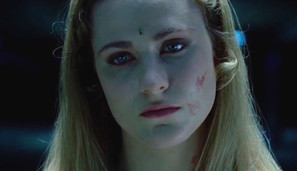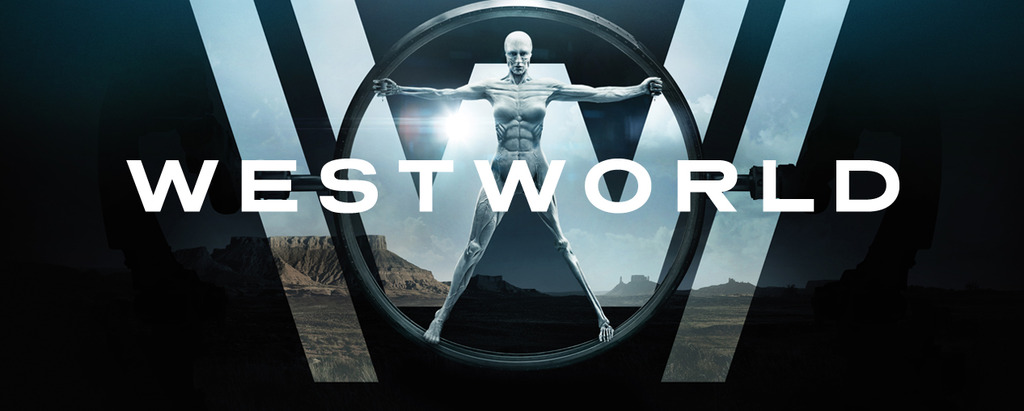| The deeper I fell into Westworld, the more I kept thinking about magic tricks. Like playwrights and screenwriters, magicians tell stories. But they follow a different set of rules. A magician’s narrative structure is short and cyclical, built on bursts of suspense. Set up the situation, misdirect the audience, then unveil your surprise. The pledge, the turn, the prestige. Rinse, rabbit, repeat. By the midpoint of Westworld—HBO’s recent television smash hit—I realized I was watching something much closer to a magic show than a TV series. |  TheCroakingFrog says: See It What Hopped: haunting performances, pitch-perfect score, world-class worldbuilding What Croaked: poor pacing, inconsistent script, wrong storytelling medium Recommendation Key: See It Now: see ASAP See It: see if you have time Skip It: see at your own risk Forget It: avoid at all costs |

*spoilers from this point forward*
Set some time in the future, Westworld is about a wild west-themed amusement park, filled with sleepy saloons, seedy motels, and old-timey shops. It’s designed by tech geeks and filled with artificially intelligent robots indistinguishable from humans. In the words of one Megan Anders Taylor, it’s Quentin Tarantino meets The Hunger Games meets Ex Machina.
There are dozens of tricks, but only wisps of a plot. The characters function like clues to a mystery or pieces of a puzzle. You’re less likely to ask “will she succeed?” than “what is she hiding?”
The magical style draws you in, but it quickly becomes unsettling. Westworld whisks you from stagecoaches to gun fights, from sexy liaisons to philosophical arguments about the nature of consciousness. Sometimes, a scene from a previous episode reappears, repeated exactly as it played out before. Other times, a seemingly key character disappears for episodes at a time.
There’s a certain genius at work here: a storytelling style that mirrors the world it depicts. The robotic hosts live scripted lives, each day begun the same as the one before. Then, here and there, a subtle change disrupts the routine: a dropped bag, a brush with a stranger, an unfamiliar picture. Just like the show itself, it’s a pattern that’s comfortable, then disorienting, then sinister, like falling into a dream that transforms into a nightmare.
For all its clever narrative tricks, however, Westworld lacks a storytelling soul. It’s often shocking, but not particularly memorable. It may be a great science experiment, but it would never work as a story by the campfire.
Part of the problem is Westworld’s pacing, which is unsteady, inconsistent and unsatisfying. Some subplots—like the Man in Black searching for the “center of the maze”—plod along at glacial pace, aimless and full of dead air. Others—like Maeve’s escape scheme—develop so quickly they threaten to unbalance the show.
Here, I blame the medium. Westworld likely would have worked better in a radical new format, rather than a standard, 10-episode series. As it stands, the tidy, structured nature of hour-long installments forces the show into a box where it doesn't belong.
What if HBO had introduced a “choose your own adventure” interactive story, complete with real choices presented to the viewer? Or perhaps a virtual reality simulation, in partnership with a company like Oculus? Hell, even a video game would probably have done better. In 10 years, I suspect we’ll look at Westworld’s first season as ahead of its time, pinned down by the conventions of classic TV.
Fortunately, the performances mostly make up for the uneven pacing and uncooperative medium. Evan Rachel Wood plays Dolores, a Southern belle meant to charm Westworld visitors with her farm-girl innocence. Wood’s vacant stare during interrogations is a perfect mix of robotic and creepy, and it makes for a series of chilling interviews. But Wood slowly injects the role with more doubt, more human-like frailty—a journey toward consciousness as beautiful as it is haunting.
Dr. Robert Ford (Anthony Hopkins) and Bernard (Jeffrey Wright) also stand out. Smart, exact and calculating, the two men mostly just talk, but their verbal sparring is so good it often outshines the special effects and gun fights.
I wound up a tad underwhelmed by The Man in Black (Ed Harris) and Teddy (James Marsden), each of whom devolve from scene stealers to caricatures. Here, we have the Game of Thrones problem, with so many good characters and not enough time for everyone. Harris is still excellent in terms of pure style—even Tyrion Lannister doesn’t have this guy’s swagger—but I thought the script let Harris down later in the season.
Similarly, the script drives Thandie Newton (Maive) into a corner, forcing her to act her way through an always bumpy, sometimes silly subplot. To her credit, she battles the script to a draw.
Even if the script is inconsistent, the visual and audio details are all incredible, a testament to the top talent on the show. Game of Thrones’ Ramin Djawadi crafts yet another classic score, simple in melody but quietly sophisticated in tone. The further the series moves along, the more indispensable the soundtrack becomes. Meanwhile, Ane Crabtree (previously, Masters of Sex) does most of the costume work, another critical component of the show. Re-watch the opening scenes in episode 2 for a tour of the various outfits—it’s meticulous work, down to the last detail.
There’s something truly transformational buried inside Westworld. It’s got more ambition than Stranger Things and more new ideas than Game of Thrones. But like the the theme park itself, there’s also something wrong with Westworld, a show that sits uncomfortably in its medium of choice. Perhaps by season 2, the series will achieve the iconic status of HBO’s most beloved shows. For now, however, it’s just a series of magic tricks.
*spoilers from this point forward*
Set some time in the future, Westworld is about a wild west-themed amusement park, filled with sleepy saloons, seedy motels, and old-timey shops. It’s designed by tech geeks and filled with artificially intelligent robots indistinguishable from humans. In the words of one Megan Anders Taylor, it’s Quentin Tarantino meets The Hunger Games meets Ex Machina.
There are dozens of tricks, but only wisps of a plot. The characters function like clues to a mystery or pieces of a puzzle. You’re less likely to ask “will she succeed?” than “what is she hiding?”
The magical style draws you in, but it quickly becomes unsettling. Westworld whisks you from stagecoaches to gun fights, from sexy liaisons to philosophical arguments about the nature of consciousness. Sometimes, a scene from a previous episode reappears, repeated exactly as it played out before. Other times, a seemingly key character disappears for episodes at a time.
There’s a certain genius at work here: a storytelling style that mirrors the world it depicts. The robotic hosts live scripted lives, each day begun the same as the one before. Then, here and there, a subtle change disrupts the routine: a dropped bag, a brush with a stranger, an unfamiliar picture. Just like the show itself, it’s a pattern that’s comfortable, then disorienting, then sinister, like falling into a dream that transforms into a nightmare.
For all its clever narrative tricks, however, Westworld lacks a storytelling soul. It’s often shocking, but not particularly memorable. It may be a great science experiment, but it would never work as a story by the campfire.
Part of the problem is Westworld’s pacing, which is unsteady, inconsistent and unsatisfying. Some subplots—like the Man in Black searching for the “center of the maze”—plod along at glacial pace, aimless and full of dead air. Others—like Maeve’s escape scheme—develop so quickly they threaten to unbalance the show.
Here, I blame the medium. Westworld likely would have worked better in a radical new format, rather than a standard, 10-episode series. As it stands, the tidy, structured nature of hour-long installments forces the show into a box where it doesn't belong.
What if HBO had introduced a “choose your own adventure” interactive story, complete with real choices presented to the viewer? Or perhaps a virtual reality simulation, in partnership with a company like Oculus? Hell, even a video game would probably have done better. In 10 years, I suspect we’ll look at Westworld’s first season as ahead of its time, pinned down by the conventions of classic TV.
Fortunately, the performances mostly make up for the uneven pacing and uncooperative medium. Evan Rachel Wood plays Dolores, a Southern belle meant to charm Westworld visitors with her farm-girl innocence. Wood’s vacant stare during interrogations is a perfect mix of robotic and creepy, and it makes for a series of chilling interviews. But Wood slowly injects the role with more doubt, more human-like frailty—a journey toward consciousness as beautiful as it is haunting.
Dr. Robert Ford (Anthony Hopkins) and Bernard (Jeffrey Wright) also stand out. Smart, exact and calculating, the two men mostly just talk, but their verbal sparring is so good it often outshines the special effects and gun fights.
I wound up a tad underwhelmed by The Man in Black (Ed Harris) and Teddy (James Marsden), each of whom devolve from scene stealers to caricatures. Here, we have the Game of Thrones problem, with so many good characters and not enough time for everyone. Harris is still excellent in terms of pure style—even Tyrion Lannister doesn’t have this guy’s swagger—but I thought the script let Harris down later in the season.
Similarly, the script drives Thandie Newton (Maive) into a corner, forcing her to act her way through an always bumpy, sometimes silly subplot. To her credit, she battles the script to a draw.
Even if the script is inconsistent, the visual and audio details are all incredible, a testament to the top talent on the show. Game of Thrones’ Ramin Djawadi crafts yet another classic score, simple in melody but quietly sophisticated in tone. The further the series moves along, the more indispensable the soundtrack becomes. Meanwhile, Ane Crabtree (previously, Masters of Sex) does most of the costume work, another critical component of the show. Re-watch the opening scenes in episode 2 for a tour of the various outfits—it’s meticulous work, down to the last detail.
There’s something truly transformational buried inside Westworld. It’s got more ambition than Stranger Things and more new ideas than Game of Thrones. But like the the theme park itself, there’s also something wrong with Westworld, a show that sits uncomfortably in its medium of choice. Perhaps by season 2, the series will achieve the iconic status of HBO’s most beloved shows. For now, however, it’s just a series of magic tricks.


 RSS Feed
RSS Feed
